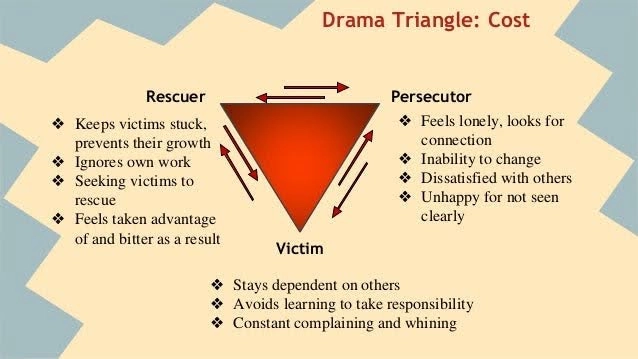Escaping the Drama Triangle: How to Step into Empowerment and Heal Relational Patterns

Have you ever found yourself stuck in repeating patterns of conflict or emotional reactivity—where you’re constantly rescuing others, feeling victimized, or becoming the “bad guy” just for asserting yourself? If so, you may be caught in what’s known as the Drama Triangle, a psychological model developed by Stephen Karpman in 1968. It’s a subtle but powerful dynamic that plays out in relationships—romantic, familial, workplace, and even within ourselves.
In this blog, we’ll explore what the Drama Triangle is, how it keeps us stuck, and how we can move into a healthier alternative: the Empowerment Triangle. You’ll also find practical tools to begin shifting these patterns—and an invitation to seek support if you need help making the transition.
Understanding the Drama Triangle
The Drama Triangle is made up of three roles:
- Victim – Feels helpless, overwhelmed, or oppressed. Thinks, “Why does this always happen to me?”
- Rescuer – Tries to save or fix the Victim, often without being asked. Thinks, “I must help them.”
- Persecutor – Blames, criticizes, or controls others. Thinks, “This is all your fault.”
We often shift between these roles unconsciously in the same relationship or even the same conversation. The triangle thrives on blame, guilt, and disempowerment, and it reinforces unhealthy boundaries and emotional dependency.
How to Spot If You’re in the Drama Triangle
Ask yourself:
- Do I often feel like the victim or that life is unfair?
- Do I try to fix other people’s problems or feel guilty when I don’t?
- Do I get frustrated and lash out when I feel taken advantage of?
If any of these resonate, it’s not about judging yourself. These roles usually originate in childhood as survival strategies. The key is awareness—and a willingness to shift.
The Empowerment Triangle: A Healthier Way to Relate
David Emerald offers a transformative alternative to the Drama Triangle called the Empowerment Triangle, which reframes the three roles:
- Victim → Creator
Instead of seeing yourself as powerless, you take responsibility for your life and choices. - Rescuer → Coach
Rather than fixing others, you support them in finding their own strength and solutions. - Persecutor → Challenger
Instead of blaming, you set boundaries and challenge others constructively and respectfully.
This model helps break the cycle of emotional reactivity and opens the door to authenticity, agency, and mutual respect.
5 Ways to Shift from Drama to Empowerment
- Pause and Notice the Role You’re Playing
Awareness is the first step. Ask, “What role am I in right now?” - Ask Empowering Questions
For example: “What can I do right now?” or “What’s the next small step I can take?” - Set Clear Boundaries
Boundaries aren’t about controlling others—they’re about protecting your own well-being without blame. - Let Others Own Their Journey
Supporting doesn’t mean rescuing. Trust that others are capable of finding their own path. - Seek Support
Changing these patterns takes time, compassion, and often a safe space to process.
You Are Not Alone
If you’re finding yourself stuck in these roles and are ready to break the cycle, know this: you don’t have to do it alone. These patterns can be deeply rooted, and it’s okay to reach out for support as you begin shifting toward healthier, more empowered ways of living and relating.
As a therapist, I’ve seen the transformation that can happen when individuals recognize their patterns and begin stepping into the Creator, Coach, and Challenger roles. You deserve to live from a place of clarity, authenticity, and self-leadership.
If this resonates and you’d like support navigating out of the Drama Triangle, I’m here to help. You can reach out to schedule a session or explore if therapy might be the right fit for you.
Reach out today—because healing begins with one empowered step.














